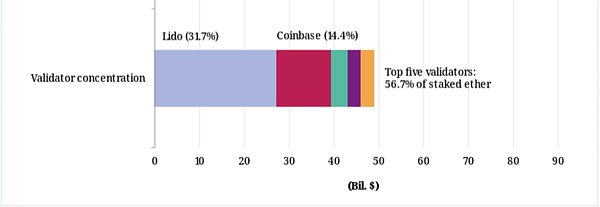S&P Global Ratings highlighted in a recent analysis thatthe U.S. may approve a spot Ethereum (ETH) exchange-traded fund (ETF) that includes a staking program , may amplify concentration risks within the Ethereum network.

According to reports, the SEC may approve an ETH ETF as early as May. However, as financial giants compete for a stake in this emerging space, the entry of ETFs could greatly affect the balance of power among Ethereum validators, creating new challenges and opportunities.
The SEC has until May 23 to rule on VanEck’s filing and may rule on other ETH ETF filings before that deadline.
1. Concentration risk
Ark Invest and Franklin Templeton’s spot Ethereum ETF proposal aims to generate additional income by staking ETH. However, if these staking-enabled ETFs see high enough inflows, they could impact participation rates on the Ethereum validation network, S&P Global analysts wrote.
According to the report, Lido currently accounts for just under a third of pledged ETH and is the largest Ethereum validator. However, the report casts doubt on the likelihood of these ETFs opting for decentralized staking protocols like Lido.
Instead, a preference for institutional cryptocurrency custodians seems more likely, suggesting differential effects on validator concentration based on the issuer's diversification strategy .

Verify ETH Concentration via S&P Global
The report also highlights that Coinbase, which serves as the custodian of certain funds, if on behalf of U.S. ETFs receiving new ETH may also bring concentration risks.
The exchange is currently responsible for approximately 15% of ETH staking, making it the second largest validator. It also serves as custodian for three of the four largest non-U.S. collateralized Ethereum ETFs.
The report states that these issues are critical because reliance on a single entity or software client can introduce risks of validator outages and attacks. It calls for increased monitoring of concentration risks and emphasizes their importance.
The emergence of new digital asset custodians could provide a way for ETF issuers to allocate their shares more broadly, which could also mitigate concentration risk.
2. JPMorgan Chase also expressed concerns
Standards Poole Global’s report echoes concerns raised by JPMorgan Chase in a recent similar analysis of Ethereum ETF spot. The lender’s report also concluded that the dominance of Lido and Coinbase poses significant concentration risks to the ecosystem.
JPMorgan Chase believes that a concentrated number of validators may become a single point of failure, endangering the stability and security of the network. This centralization also provides lucrative targets for malicious attacks, ranging from hacking to coordinated disruptions of network operations.
Additionally, analysts at JPMorgan warned of possible collusion among major validators. An oligopoly of validators can manipulate the network’s governance and operating parameters to their own advantage, at the expense of Ethereum’s broader user base.
This could take the form of censoring transactions, giving preferential treatment to certain operations, or front-running transactions — practices that erode trust in Ethereum’s fairness and transparency .
Ensuring that Ethereum remains a strong, secure and decentralized platform requires a collective effort to mitigate concentration risks and create an environment where any validator Neither a single entity nor a group of validators can exercise disproportionate power.
 Huang Bo
Huang Bo
 Huang Bo
Huang Bo Bernice
Bernice JinseFinance
JinseFinance JinseFinance
JinseFinance JinseFinance
JinseFinance Huang Bo
Huang Bo JinseFinance
JinseFinance JinseFinance
JinseFinance JinseFinance
JinseFinance JinseFinance
JinseFinance